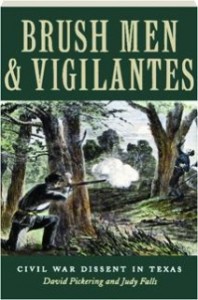One of my very favorite places is about twenty miles from my home. As often as I can, I drive over to Commerce, go to Gee Library on the Texas A&M University Commerce campus and take the elevator to the fourth floor, even though I have used the stairs on occasions. There is a floor full of wonderful old documents, letters, photographs, and memorabilia from the past, plus an incredibly nice and knowledgeable staff. It’s a local historian’s dream come true.
I first learned about what was then called The Archives in the summer of 1979 when I took my first local history researching and writing workshop under the late Dr. Ralph Goodwin and the new archivist Dr. Jim Conrad. I have three very special college courses I hold dear, Texas History under the late Dr. Kenneth Neighbours, the local history workshop, and my thesis work. The Archives played an important role in the last two.
Dr. Conrad did a phenomenal job collecting materials, recording oral histories, writing about East Texas, and organizing the Digital Collection for which the college is famous. After Dr. Conrad’s retirement in 2010, Andrea Weddle became the Head of Special Collections and Archives. Like the college itself, the name of the department changed to keep up with the times. But the same great materials are still there.
But now they are easier to use. For a period before Dr. Conrad’s retirement, Andrea was assigned the task of creating Finding Aids. Those are lifesavers for anyone seriously interested in a particular historical topic. Basically a Finding Aid is an index to a certain collection. A very good example is the Judy Falls Collection at TAMUC. Falls and her cousin David Pickering wrote Brush Men & Vigilantes in 2000. It was the first of several works that addressed the issues of Civil War dissent here in Northeast Texas. After publication of their work, Ms. Falls donated her research notes to the Gee Library’s Special Collection. With the index, the researcher interested in the thickets of Northeast Texas can go to Special Collections, ask to see the Falls Collection Finding Aid, look for “thickets” and then ask to see those files pertaining to “thickets.” The staff will bring out several file folders in an acid free box for you to read everything Pickering and Falls used on that topic in their book.
Why not just read the book and call it quits? Authors use many sources of information, everything from PhD. dissertations to actual newspaper articles of the time to personal letters written about the subject. Because of size limitations in books, the authors must decide how to trim the information into a usable format. Not every tidbit is included.
As an example, I am currently interested in land speculators in the Republic of Texas. So I don’t need to read about wildlife on the Blackland Prairies or social life in Bonham in 1839. By looking at several Finding Aids, I can determine which collections I want to review, which file folders in the collection I want to examine, and not have to literally dig through stacks and stacks of old papers.
So I am very indebted to historians like Dr. Conrad and Andrea Weddle. They make my work so much easier. But sometimes, it is fun to go through the papers in the collection. It’s like buying shoes, when I want navy sandals; I want to try on every pair of navy sandals in the store. Sometimes I like to read everything Judy Falls found about Hunt County.

